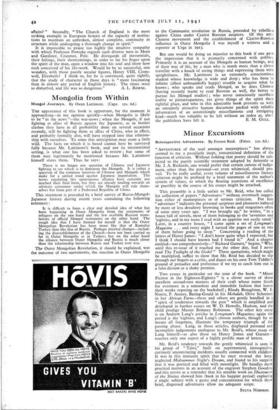Minor Excursions
Retrospective Adventures. By Forrest Reid. (Faber. I25. 6d.) "ADVENTURES of the soul amongst masterpieces" has always seemed to me a peculiarly inept, romanticised definition of the function of criticism. Without holding that poetry should be sub- jected to the purely scientific treatment adopted by Aristotle or Mr. I. A. Richards, one would prefer that certain canons of judge- ment, other than the personal—or even whimsical, should pre- vail. To be really useful, every volume of miscellaneous literary criticism might be prefixed by a brief statement of the author's system of values, to which the floating assertions of excellence or puerility in the course of his essays might be attached.
This preamble is a little unfair to Mr. Reid, who has called his collection of papers " Adventures " without overmuch sugges- tion either of masterpieces or of serious criticism. For him " adventure " indicates the personal surprises and pleasures induced by more or less desultory browsing in books and magazines often of some sixty years ago. "I was brought up," he writes, "in a house full of novels, most of them belonging to the 'seventies and 'eighties, and in my teens I read with an appetite not easily sated." Later, in a country house, "I came upon a set of Longman's Magazine . . . and every night I turned the pages of one or two of them before going to sleep." Concerning a reading of the letters of Henry James : "I don't know quite what I expected, but I think I should have known had I found it." And a chapter entitled—too comprehensively—" Richard Garnett," begins, " Why, until this re-issue of it reached me the other day, had I never read The Twilight of the Gods?" These quotations, which might be multiplied, suffice to show that Mr. Reid has decided to slip through our fingers as a critic, and dance on his own Tom Tiddler's ground of prejudice and preference if we try to catch him out in a false dictum or a shaky premise.
Two essays in particular set the tone of the book. "Minor Fiction in the Eighteen-Eighties" is a clever survey of those excellent second-rate masters of their craft whose name liveth for evermore in a somnolent and immobile fashion that leaves their works reposing on the bookshelf ; Rhoda Broughton, W. E. Norris, F. Anstey, Baring-Gould in his Mehalah, Olive Schreiner in her African Farm—these and others are gently handled in a "spirit of tenderness towards the past" which is amplified and developed in further essays on W. D. Howells, Hudson, and the child prodigy Master Romney Robinson. The other key essay is on Andrew Lang's articles in Longman's Magazine; again the period is the 'eighties, and Lang's chosen authors, though by no means all forgotten, illustrate the temporary triumph of the passing phase. Lang, in those articles, displayed personal and incomplete judgements analogous to Mr. Rei&s, whose essay on Lang himself—as also those on Henry James and Garnett— touches only one aspect of a highly prolific man of letters.
Mr. Reid's tendency towards the gently whimsical is seen in his group of "Tales," built on supernatural, introspective, curiously unconvincing incidents usually connected with children. It was in this innocent spirit that he once re-read the long- neglected Midsummer Night's Dream, and found to his surprise that it was poetical and filled with moonlight. He handles more practical matters in an account of the engraver Stephen Gooden; and this serves as a reminder that his notable work on Illustrators of the Sixties showed him (back in his happier period) exploring a single subject with a gusto and concentration for which these brief, dispersed adventures allow no adequate scope.
SYLVA NORMAN.


























 Previous page
Previous page